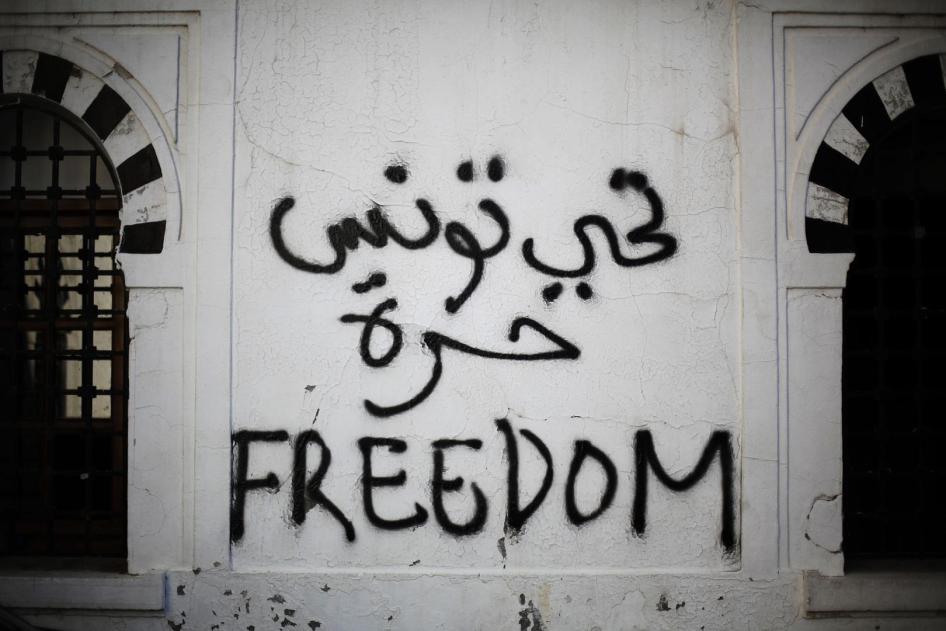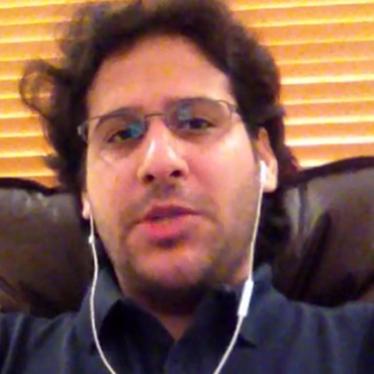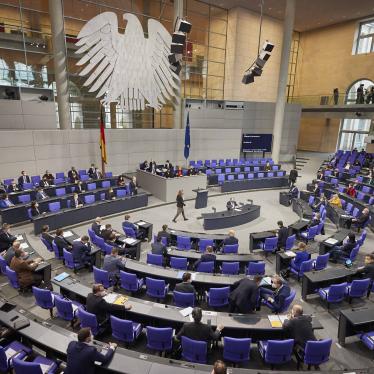(Tunis) – Tunisian authorities are investigating, charging, and in some cases detaining bloggers and social media activists merely for their peaceful criticism of public officials, Human Rights Watch said today. Several said they have begun to censor themselves because of police action and threat of prosecution.
At least nine bloggers have faced criminal charges since 2017 for comments on social media platforms criticizing high public officials, accusing them of corruption or allegedly insulting them. Human Rights Watch interviewed seven of them and several of their lawyers.
“The continued use of repressive, authoritarian-era laws to silence bloggers for peaceful criticism is indefensible eight years after the revolution,” said Eric Goldstein, deputy Middle East and North Africa director at Human Rights Watch.
The charges frequently include accusing public officials of crimes related to their jobs without furnishing proof of their guilt, under article 128 of the penal code, which provides for up to two years in prison. Many of those charged under article 128 have also been charged under the broadly worded article 86 of the telecommunications code. That law, dating to the period when Zine el-Abidine Ben Ali was president, provides for one to two years in prison for anyone who “willfully knowingly harms others or disturbs them via public telecommunications networks.”
On August 29, 2018, Amina Mansour, a blogger, posted a status update on her Facebook wall addressing Prime Minister Youssef Chahed, saying that member of parliament “Fadhel Omrane did not lie when he told you that you gave promotions to all the criminals in the customs agency. Pow! Sorry, Youssef, my dear, your corruption show has fallen apart.” The post also accused a customs official of corruption and the prime minister of promoting corrupt customs officials.
On September 12, officers from the Hay el Khadra police station in Tunis summoned Mansour and interrogated her for two hours, including about the sources of the information she had posted. The prosecutor sent her to jail, where she spent one night.
Authorities charged Mansour with violating both article 128 of the penal code and article 86 of the telecommunications code. A court of first instance convicted Mansour of both crimes and sentenced her to one month in prison for each of the two charges, suspended. She has appealed.
A group of Tunisian lawyers has formed an association called “Bloggers without Chains” in response to the wave of prosecutions, sometimes waiving their customary fees.
Mohamed Ali Bouchiba, secretary-general of the association, told Human Rights Watch that prosecutors seem to be targeting bloggers with large followings.
Tunisian authorities should reform laws like penal code article 128 and telecommunications code article 86 that are incompatible with the protections of freedom of expression in the 2014 constitution and in the International Covenant on Civil and Political Rights, which Tunisia has ratified, Human Rights Watch said. In 2011, Tunisia’s transitional authorities eliminated from the press code and the law pertaining to broadcast media some of the criminal penalties for speech offenses. But the authorities continue to prosecute peaceful speech under the repressive laws that remain in force.
In addition to article 128, article 125 of the penal code punishes “insulting a public officer during the performance of his duties,” with up to one year in prison. Article 67 of the penal code, which dates to 1956, punishes anyone “guilty of insulting the head of state” with up to three years in prison. Articles 245 through 247 define defamation and “calumny” as criminal offenses punishable by six months and one year in prison, respectively. These articles date to the French colonial era.
Article 19 of the International Covenant on Civil and Political Rights (ICCPR) ensures the right to freedom of opinion and expression, including the right to seek, receive, and impart information and ideas on all kinds, orally, in writing, or in print, in the form of art, or through any other media of the person’s choice, on the condition that the expression does not harm anyone’s reputation or endanger the public order.
The United Nations Human Rights Committee, the international body of experts who interpret the ICCPR, has said that all public figures are legitimately subject to public criticism, and that there should be no prohibition of criticism of public institutions. Defamation should be treated as a civil, not a criminal, issue and never punished with a prison term, the committee recommended
The committee said “that in circumstances of public debate concerning public figures in the political domain and public institutions, the value placed by the Covenant upon uninhibited expression is particularly high. Thus, the mere fact that forms of expression are considered to be insulting to a public figure is not sufficient to justify the imposition of penalties.”
Moreover, all public figures, including those exercising the highest political authority such as heads of state and government, are legitimately subject to criticism and political opposition.
“As long as these legal tools to muzzle criticism remain on the books, Tunisian authorities can’t resist the temptation to use them,” Goldstein said. “With Tunisia’s progressive constitution turning five years old on January 26, it is high time for parliament to eliminate these laws that violate its spirit.”
Amina Mansour
On September 12, five days after Amina Mansour, a blogger who lives in Ben Arous, received a summons, the police questioned her at the criminal cases branch office at the Hay el Khadra police station about an August Facebook post. In her post, Mansour criticized Prime Minister Youssef Chahed for allegedly promoting corrupt customs officers. She also accused a general director at the Customs Office of removing a regional director from his position after he referred a lower-ranking customs officer to court on suspicion of smuggling.
Mansour told Human Rights Watch that police interrogated her for more than two hours, following which the public prosecutor ordered her detained for the night at Bouchoucha prison. Mansour said that the police demanded repeatedly, “How do you know this information and where did you get it?”
Mansour said that she told the police that she had merely shared information she had seen elsewhere on Facebook, without verifying it. The prosecutor accused Mansour of offending others through the public means of telecommunications and attributing illegal acts to a public employee without providing proof, under article 86 of the code of telecommunications and article 128 of the penal code, respectively. The Ben Arous Court of First Instance sentenced Mansour to a two-month suspended prison sentence. Her appeal is set for February 19 in Tunis.
Aymen Ben Selma
Aymen Ben Selma blogs on his own Facebook page and previously managed a Facebook blog called The Yakin Official Press Website, which had over 40,000 followers as of January 7. On December 2, 2017, the National Guard in Sousse summoned Ben Selma for questioning. On December 22, a prosecutor charged him with violating article 86 of the telecommunications code and article 67 of the penal code, which punishes insults to the president.
These charges stemmed from a post on Ben Selma’s Facebook wall from May 2015. The post listed the names of several high government officials and political advisers with a description after each one, such as “homosexual” and “Zionist agent.” The post refers to President Beji Caid Essebsi as “zindiq,” an Arabic term for someone who pretends to be a Muslim but is secretly an unbeliever. Another post written on Ben Selma’s wall called then-Interior Minister Lotfi Brahem a comedian, accusing him of plotting a coup.
On February 6, 2018, a Sousse Court of First Instance sentenced Ben Selma to six months on each charge, for a total of one year in prison. Ben Selma appealed, and the appeals court upheld the verdict and sentence on May 21. After Ben Selma further appealed on procedural grounds, the court, on December 6, 2018, reduced his sentence to two months in prison, suspended – one month for violating article 67 of the penal code and one month for violating article 86 of the telecommunications code.
Ben Selma told Human Rights Watch that he stopped updating the Yakin website in 2018 because he feared that further charges would result in his immediate detention while his case was pending.
Hichem Mejri
The National Guard’s Tunis intelligence and research unit questioned blogger Hichem Mejri on September 6, 2017, about his criticism on Facebook of the Tunisian president, of the “excessive” use of force by security forces, and about his accusations of corruption against a prison director and other officials. They also asked about his opinion on police efforts to combat terrorism and whether he doubted the martyrdom of the military officers who had lost their lives, Mejri told Human Rights Watch.
On September 7, 2017, the public prosecutor referred Mejri to the criminal chamber of a Tunis Court of First Instance on charges of violating article 86 of the telecommunications code and article 128 of the penal code. The court acquitted him on all charges in October 2018.
Sahbi Amri
The authorities have opened more than two dozen criminal cases against Sahbi Amri, said his lawyers, Mohamed Ali Bouchiba and Nadia Chaouachi, and detained and released him numerous times over the last few years. On September 11, 2017, the public prosecutor of the court of Manouba opened an investigation against Amri, stating that after leaving Mornaguia prison four days earlier, Amri proceeded to commit the same offenses for which he had initially been imprisoned.
The prosecutor’s report states that Amri had used a different account on Facebook to post writings that offend state institutions, insult the president, offend members of the government and public officials, mock the judiciary, and refer to the state as “full of garbage,” violating article 86 of the code of telecommunications, and articles 67 and 128 of the penal code.
A police report that Human Rights Watch reviewed indicates that the police had listed Amri as “wanted” since November 2017 in connection with these accusations. The National Guard arrested him on December 23, 2017. The Manouba court prosecutor charged Amri under articles 128 and 67 of the penal code and article 86 of the telecommunications code. A Tunis court sentenced Amri to one-and-a-half years in prison in early March for defamation against a high security official. He was released later that month after an appeals court found in his favor.
The authorities detained Amri again in late December 2018 in connection with several accusations against him. On January 3, 2019, a Tunis Court of First Instance sentenced him on two counts of defaming prosecutors of the court, Arbia Bouselma and Lotfi Ben Slimane, and sentenced him to 18 months on each count for a total of three years in prison. Amri had written a post criticizing them for not opening an investigation into government corruption.
On January 4, 2019, a Tunis Court of First Instance sentenced Amri to an additional two-and-a-half years in prison on charges that include violating article 86 of the telecommunications code and article 128 of the penal code. This case was related to Amri sharing a Facebook post by a group called “l’aigle blanc” (“White Eagle”) that criticized the former head of Tunisia’s High Judicial Council, Malika Mazari.
Amri is being held in Mornaguia prison.
Alaa Abd Dhaher
Alaa Abd Dhaher, a 24-year-old from the city of Douz, in the southern governorate of Kebili, published a post on June 25, 2018, criticizing a Facebook post written by Mahbouba bin Dhifallah, an Ennahdha Party parliament member, congratulating President Recep Tayyip Erdogan of Turkey, for his win in the June 2018 elections. Human Rights Watch reviewed these posts, which were at one point publicly available but which are no longer public.
In apparent solidarity with Erdogan, whose party has roots in the same Islamist thinking as Ennahdha, Bin Dhifallah had written a Facebook post on her personal wall that included, “I congratulate us for this success.” In response, Abd Dhaher posted a comment on Bin Dhifallah’s post, asking: “Who is this ‘us’ that Bin Dhifallah is referring to?” Then, addressing Bin Dhifallah directly he asks: “Are you Turkish? Congratulations to us?... Who do you belong to?” Abd Dhaher went on to suggest that people like Bin Dhifallah have brought misery on the region.
Abd Dhaher told Human Rights Watch that in July 2018, he received a phone call from a friend who said that Bin Dhifallah’s husband had asked him to ask Abd Dhaher to stop his critical Facebook posts about Bin Dhifallah. Abd Dhaher said that he continued to share his opinions online about her work.
On October 23, 2018, the National Guard in Kebili summoned Abd Dhaher and on October 31, interrogated him for 30 minutes, in the presence of his lawyer based on a complaint brought by Bin Dhifallah. At the end, Abd Dhaher said, he signed a police report of the session. He added that the officers said that if he apologized to Bin Dhifallah, she would drop the complaint.
Abd Dhaher told Human Rights Watch that he would not apologize. He said that while he had not heard again from the police or been notified of any charges filed against him, he had stopped posting criticisms of Bin Dhifallah.
Dali Mak
Security forces from the General Directorate of Intervention Units under the Interior Ministry detained a blogger who writes under the pseudonym “Dali Mak” at his home in Tunis early on December 1, 2018. Mak spent two nights incommunicado at Bouchoucha jail on suspicion of a terrorism-related offense. In such cases, article 13 of Tunisia’s code of penal procedures allows the prosecutor or the investigative judge to delay access to a lawyer for 48 hours after detention.
On December 3, the authorities transferred Dali Mak to the anti-terrorism judicial unit in Tunis for questioning about a blog post but released him an hour later. Mohamed Ali Bouchiba, a lawyer representing Mak, said that the post stated that the Tunisia’s current economic crisis could be exploited by terrorists. The lawyer said authorities construed the post as potentially amounting to incitement to terrorism. No charges were pressed after Mak’s release. The blogger’s lawyer asked Human Rights Watch not to disclose his real name.
Saif Midani
On November 5, the First Central Command Unit of the National Guard’s Intelligence and Research Office in El Aouina, Tunis, questioned a poet and playwright, Saif Midani, in the presence of his lawyers. The officers asked Midani to open his Facebook account using one of the computers in the office, but Midani refused.
Midani told Human Rights Watch that the Interior Ministry had filed a complaint about a Facebook post in October 2017 criticizing then-Interior Minister Lotfi Brahem and his ministry, President Essebsi, and Prime Minister Chahed. Midani said the police questioned him for five hours, then told him to sign a statement that says he is under investigation for various accusations. He did not confirm that he wrote the post. Midani said he has not been contacted again in relation to these accusations and has not been charged.
Other Cases
In addition to the cases described here, Tunisian authorities have also prosecuted several other bloggers for their blogposts, including Member of Parliament Yassine Ayari, Fedy Ben Salah, Mohamed Yacine Amri, Jameleddine Al-Hammami, and Mohamed Naim Haj Mansour.







